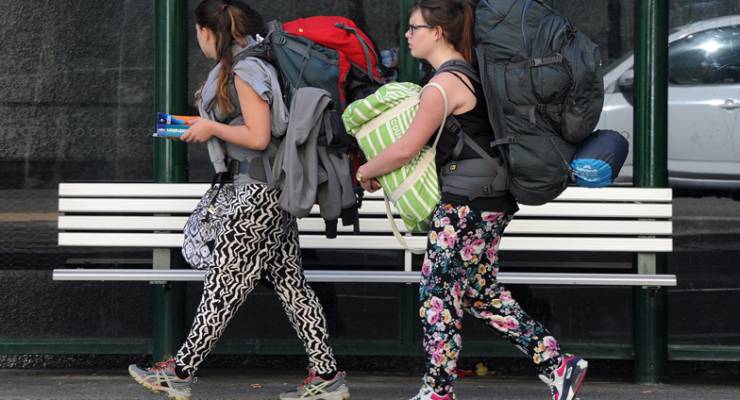
This week the government, in caretaker mode, announced it would suspend plans to implement what is being referred to as a “backpacker tax”, in a move expected to keep regional and rural electorates very happy. But what was it even there for in the first place?
What is the backpacker tax?
While the Turnbull Coalition Team, as it is now collectively known, would like the public to focus only on the contents of the 2016-2017 budget, one of the few remaining barnacles from former treasurer Joe Hockey’s second and last budget in 2015 was a plan to change how tourists who decide to work in Australia — such as backpackers who pick fruit — are taxed.
Currently, backpackers who spend time in Australia picking fruit, working in cafes, or working as delivery couriers can be treated as residents for tax purposes if they’re between 18 and 30 and are from a partner country to Australia’s Working Holiday Maker program. They need to have a tax file number and an appropriate visa, but the scheme is a way for tourists to extend their holidays in Australia by working as they travel.
That means that their income isn’t taxed if they earn less than $18,200, the same as permanent Australian residents. For every dollar over that they are taxed 19 cents, and then for every dollar over $37,001 it is 32.5 cents and so on.
The government announced in the 2016-17 budget that it would change the definition so that backpackers could no longer claim to be residents for tax purposes, and would therefore pay tax from the very first $1 they earn in Australia, at the rate of 32.5 cents in every dollar, and progressively moving up if they’re earning incomes over $80,000 or $180,000 per year.
Why was it government policy?
It’s all about revenue raising. The government estimated in the 2015 budget that this measure would bring $540 million into the government coffers over the forward estimates.
Why were people worried about it?
Australia is a big tourism country, tourists generally spend more and visit more parts of Australia than locals, and regional and rural farmers need workers. The argument put to the government over the past year is that if the backpacker tax were implemented, then not only would tourism in Australia suffer as a result of fewer people choosing to come to Australia and extend their stay here, but farmers would struggle to fill jobs because of the high tax rate backpackers would have to pay.
When was it due to start?
July 1, 2016, just one day before the election.
What has the government announced?
Assistant Treasurer Kelly O’Dwyer announced there would be a “whole of government review” of the scheme with a review of the 417 and 462 visas after the election, should the Coalition win government. This would be finalised by mid-October, and the start of the tax being applied to backpackers has been delayed until January 1, 2017.
Why wasn’t it announced in the budget?
It seems unusual that this was a hangover from the last budget that wasn’t dealt with in this budget, but at the time, Treasurer Scott Morrison insisted there was still work to be done.
Do all the parties support the announcement?
The Greens support scrapping the tax entirely. Labor has cautiously welcomed the delay and has called for its scrapping before, but the ALP has not yet said what its position is on the scheme. The difficulty is that Labor wants to know whether the government intends to count the funding as a “saving” to improve its budget bottom line position. If this is the case, then the Coalition can claim to be stopping the tax for now, but the government can still use the $540 million in revenue in its calculations to achieve a better budget line than Labor.
Labor has also asked whether the ATO will begin collecting the taxes retrospectively and if the answer is yes, it would mean that although there might be a “pause”, backpackers would still end up paying the same tax.
What happens next?
All things are paused for the election, but for now, backpackers, the tourism sector and farmers have some relief.








Unfortunately fruit picking and the like is seasonal and hard work and means travel. Most Australians don’t like this combination and by the time they pay tax it is not worth it. They are better off staying on the dole. Without the backpackers the industry is in trouble.
yeah it totally has nothing to do with a constant stream of foreign labour willing to work for cheap, making it so the jobs can never be better than being on the dole.
The working holiday visa program destroyed livelihoods for many Australians who travelled one of a number of annual fruit-picking routes. Unlike backpackers, however, they had a limit to how ripped off they’d let themselves be. There are a smattering of good growers, a lot of pretty indifferent ones and a good amount of complete bastards, very willing to churn through as many backpackers as will put up with a once-in-a-lifetime experience of abuse and exploitation. I feel sorry for the backpackers being over-taxed, but no sympathy for the fruit and veggie growers, who’d have no trouble getting Australians to work for them if they didn’t treat their workers like dirt.
Would have been easier to tax them at the same rate as NZ (19%?) in the first place, which is probably where they will end up.